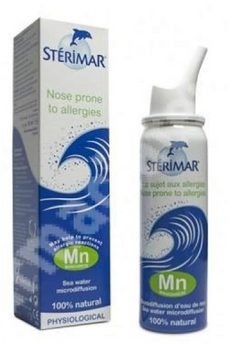Free Delivery on all Orders Over €100
Pollen allergy

Pollen allergy
Pollen allergy (hay fever) is a common form of allergy, and causes symptoms such as itching, sneezing and runny eyes and nose. Get good advice and tips about pollen allergies and how you can get rid of the symptoms of allergies here.
What is pollen allergy?
Pollen allergy is an allergy to certain proteins in pollen from various types of plants. In the case of a pollen allergy, the immune system is activated when you come into contact with certain types of pollen. This activation triggers the typical allergic symptoms.
Pollen is small particles from plants, which are spread by wind or insects to pollinate other plants of the same species. The most common types of pollen to react to are birch, alder, hazel, various types of grass (especially timothy and dog grass), burroot and salix. Salix is a collective term for willow, willow and willow.
Pollen season
The pollen season can start as early as February and last until September. The seasons start differently depending on where in the country you live, and not all pollen types are equally relevant throughout the country. Pollen allergy sufferers should follow the pollen warning.Remember that if you have a proven pollen allergy, you should start taking medication well before the pollen season.
Allergy medicines
Pollen allergy causes the immune system to react abnormally strongly to pollen. Allergy medicines subdue the body's strong reaction to pollen. In this way, the symptoms are reduced or gone. Allergy medicines do not cure the allergy itself. People with a known pollen allergy should start well before the allergy season starts. The allergy medicines should be used throughout the season, also on days with little pollen. There are over-the-counter allergy medications in the form of tablets, eye drops and nasal sprays.
Symptoms of pollen allergy
Itchy, runny or stuffy nose
Itchy, watery, red or swollen eyes
Sneezing, often serial sneezing
Itching in the mouth, throat and throat
Fatigue and reduced ability to concentrate
Allergy vaccination
There is a form of treatment against pollen allergy called allergy vaccination. This is a time-consuming treatment where you are given tiny doses of the substance (allergens) you are allergic to. Eventually the body gets used to the allergen and the dose can be increased. The body's allergic reaction is reduced or completely eliminated.
Tips and advice for pollen allergies
In addition to drug treatment, there are a number of tips you can follow that can ease the pain during allergy season:
Close windows and doors during the day, especially in the sun and wind. Air rather in the evening and at night.
Use pollen nets on windows
Do not dry clothes outside during the pollen season
Sunglasses can reduce the amount of pollen that gets into the eyes
Shower in the evening after you have been out. Remember to rinse your hair so that you remove the pollen from your hair as well.
Use soft paper when you cheat, ordinary toilet paper and toilet paper make the skin on and around the nose red and dry more quickly.
Red and dry noses benefit from an oily cream that repairs the skin.
Medicines for pollen allergy
For mild forms of pollen allergy, you can try over-the-counter medicines. If you have severe or long-lasting allergy symptoms, you should see a doctor. Uncontrolled pollen allergy can lead to asthma, sinusitis, polyps in the nose and ear infections. Remember to read the package insert before using medication.








